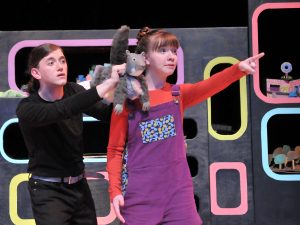Learning to Make Theatre More Accessible: Emerson Stage Goes Sensory-Friendly
Students rehearse a scene from Flora & Ulysses. Emerson Stage is presenting two sensory-friendly productions of the show. Photo/Craig Bailey
By Erin Clossey
In a way, Joe Antoun is directing two shows for this season’s Emerson Stage theatre for young audiences (TYA) production.
There’s Flora & Ulysses, a stage adaptation of Kate DiCamillo’s 2014 Newbery Medal-winning novel about a girl and a squirrel. And then there’s Flora & Ulysses adapted for audiences with sensory integration issues.
“It’s exciting,” Antoun, senior affiliated faculty member in Performing Arts, said of his maiden voyage into sensory-friendly theatre. “It’s including people that may be excluded from seeing plays sometimes.”
Emerson Stage worked with faculty and students from the College’s Communication Sciences and Disorders (CSD) department, as well Ellen Rothfuss ’17, a CSD alumna who advises theatre companies on how to make shows accessible to audiences on the autism spectrum, to stage two sensory-friendly performances of Flora & Ulysses.
A November 3 sensory-friendly matinee will be followed by another on Saturday, November 10, 2:00 pm, in the Semel Theater. Tickets are still available for that show, as well as two more general audience performances on Friday, November 9, 8:00 pm, and Saturday, November 10, 8:00 pm.
Emerson Stage has made YTA performances accessible in the past, said the company’s general manager, David Colfer. During the 2014-2015 season, Emerson Stage integrated American Sign Language (ASL) interpreters into the performance of Susan Zeder’s Mother Hicks, about a deaf man. And they’ve made their YTA plays accessible in a more holistic way by removing economic barriers and working with school groups, he said.
But Flora & Ulysses marks the first time Emerson Stage is making a performance accessible to young people with autism spectrum disorder (ASD) or other sensory issues — a growing movement in small regional theaters and Broadway shows alike. In the 2018-2019 season, the Theatre Development Fund has offered or will offer autism-friendly productions of SpongeBob SquarePants the Broadway Musical (sold out), The Lion King, Frozen, Aladdin, and My Fair Lady.

People with sensory integration issues are affected in myriad ways, but there are some common hallmarks that can be prevalent in a stage show, said CSD clinical instructor Elaine Rudel, who is working with Antoun and his students on the production.
“Often there are sudden noises in a theater,” she said. “Or maybe flashing lights or bright lights at different periods of time. Any sudden movements or sounds or sights can be disturbing [to those with sensory integration disorders].”
Ticket holders to sensory-friendly performances receive supplemental materials ahead of time explaining the process for attending a play, as well as photos of the actors in costume so there are no surprises.
Rudel and her department are sharing material that they use at Emerson’s Robbins Speech, Language, and Hearing Center to create safe spaces in the lobby for children with sensory issues if they become overwhelmed. There are cushions for kids to sit on, toys for fidgeting, and small tent-like spaces for those who need enclosure to calm down, she said.
But to reduce the chance that kids will need to retreat to the lobby, Antoun and his team have made some adjustments to the production to help audience members stay engaged and relaxed.
Flora & Ulysses is fairly heavy on the sensory output, he said, so it’s a good show on which to learn how to adapt it for this audience.
In DiCamillo’s beloved story, Flora Belle Buckman, a 10-year-old comic book enthusiast, saves a squirrel about to be vacuumed up by her neighbor. The squirrel, who she names Ulysses, emerges from his ordeal with the powers of flight and poetry.
The show presented Antoun with “a lot of wheels turning.”
For one, Ulysses the squirrel is played by both a puppet and an actor, James La Bella ‘20, who amplifies the puppet’s movements and narrates the squirrel’s thoughts. It was his first time directing a show with puppets, and he learned “you have to take special care that they don’t become a prop, that you keep it emotionally fluid and emotionally live on stage.”
He also discovered that directing a sensory-friendly performance isn’t just about avoiding strobes, or keeping the sound volume lower.
“It’s about actors talking loud or moving suddenly or changing their look too much [creating a disconnect with audiences],” he said.
Flora & Ulysses is not the first sensory-friendly performance La Bella (Ulysses) and scenic and projections designer Kaitlin Umlang ’19 worked on.
La Bella did a sensory-friendly production of Honk!, a musical adaptation of The Ugly Duckling, with an Emerson student theatre group, an experience he said he was “grateful” for.
With Ulysses, La Bella said there isn’t a great difference in the way he performs him, but some of the stage directions are altered.
“Some of my blocking is changed a little bit,” he said. “There are moments where I interact directly with the audience, and we’ve just created some physical distance between me and the audience.”
Most of the differences in his scenes come in the form of light and sound, he said. “The show includes a lot of surprise attacks from a cat. We’re finding ways to soften those, because those surprises [in the general production] are accompanied by a lot of audio and visual [effects].”
Umlang has worked on sensory-friendly shows at Magik Children’s Theatre in her native San Antonio, where they make it a goal to do one sensory-friendly performance per run.
Her comic book-inspired set design and thought bubble projections work for sensory-friendly audiences, but it is important to make sure scene transitions and projections are smooth and fluid, she said.
“We don’t want to give a watered-down performance,” Umlang said. “The audience deserves the same magic everyone experiences.”
Categories